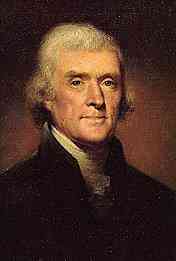To Dr. Joseph Priestley Washington, Jan. 29, 1804
 DEAR SIR,
DEAR SIR,-- Your favor of December 12 came duly to hand, as did the 2'd. letter to Doctor Linn, and the treatise of Phlogiston, for which I pray you to accept my thanks. The copy for Mr. Livingston has been delivered, together with your letter to him, to Mr. Harvie, my secretary, who departs in a day or two for Paris, & will deliver them himself to Mr. Livingston, whose attention to your matter cannot be doubted. I have also to add my thanks to Mr. Priestley, your son, for the copy of your Harmony, which I have gone through with great satisfaction. It is the first I have been able to meet with, which is clear of those long repetitions of the same transaction, as if it were a different one because related with some different circumstances.
I rejoice that you have undertaken the task of comparing the moral doctrines of Jesus with those of the ancient Philosophers. You are so much in possession of the whole subject, that you will do it easier & better than any other person living. I think you cannot avoid giving, as preliminary to the comparison, a digest of his moral doctrines, extracted in his own words from the Evangelists, and leaving out everything relative to his personal history and character. It would be short and precious. With a view to do this for my own satisfaction, I had sent to Philadelphia to get two testaments Greek of the same edition, & two English, with a design to cut out the morsels of morality, and paste them on the leaves of a book, in the manner you describe as having been pursued in forming your Harmony. But I shall now get the thing done by better hands.
I very early saw that Louisiana was indeed a speck in our horizon which was to burst in a tornado; and the public are unapprized how near this catastrophe was. Nothing but a frank & friendly development of causes & effects on our part, and good sense enough in Bonaparte to see that the train was unavoidable, and would change the face of the world, saved us from that storm. I did not expect he would yield till a war took place between France and England, and my hope was to palliate and endure, if Messrs. Ross, Morris, &c. did not force a premature rupture, until that event. I believed the event not very distant, but acknolege it came on sooner than I had expected. Whether, however, the good sense of Bonaparte might not see the course predicted to be necessary & unavoidable, even before a war should be imminent, was a chance which we thought it our duty to try; but the immediate prospect of rupture brought the case to immediate decision. The denoument has been happy; and I confess I look to this duplication of area for the extending a government so free and economical as ours, as a great achievement to the mass of happiness which is to ensue. Whether we remain in one confederacy, or form into Atlantic and Mississippi confederacies, I believe not very important to the happiness of either part. Those of the western confederacy will be as much our children & descendants as those of the eastern, and I feel myself as much identified with that country, in future time, as with this; and did I now foresee a separation at some future day, yet I should feel the duty & the desire to promote the western interests as zealously as the eastern, doing all the good for both portions of our future family which should fall within my power.
Have you seen the new work of Malthus on population? It is one of the ablest I have ever seen. Altho' his main object is to delineate the effects of redundancy of population, and to test the poor laws of England, & other palliations for that evil, several important questions in political economy, allied to his subject incidentally, are treated with a masterly hand. It is a single 4'to. volume, and I have been only able to read a borrowed copy, the only one I have yet heard of. Probably our friends in England will think of you, & give you an opportunity of reading it.
Accept my
affectionate salutations, and assurances of great esteem & respect.

